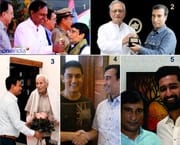Dr. Suresh Kumar Mishra ‘Uratript’
Dr. Suresh Kumar Mishra, known for his wit and wisdom, is a prolific writer, renowned satirist, children’s literature author, and poet. He has undertaken the monumental task of writing, editing, and coordinating a total of 55 books for the Telangana government at the primary school, college, and university levels. His editorial endeavors also include online editions of works by Acharya Ramchandra Shukla.
As a celebrated satirist, Dr. Suresh Kumar Mishra has carved a niche for himself, with over eight million viewers, readers, and listeners tuning in to his literary musings on the demise of a teacher on the Sahitya AajTak channel. His contributions have earned him prestigious accolades such as the Telangana Hindi Academy’s Shreshtha Navyuva Rachnakaar Samman in 2021, presented by the honorable Chief Minister of Telangana, Mr. Chandrashekhar Rao. He has also been honored with the Vyangya Yatra Ravindranath Tyagi Stairway Award and the Sahitya Srijan Samman, alongside recognition from Prime Minister Narendra Modi and various other esteemed institutions.
Dr. Suresh Kumar Mishra’s journey is not merely one of literary accomplishments but also a testament to his unwavering dedication, creativity, and profound impact on society. His story inspires us to strive for excellence, to use our talents for the betterment of others, and to leave an indelible mark on the world.
- Honoured with ‘Shrestha Navayuvva Rachnakar Samman’ by former Chief Minister of Telangana Government, Shri K. Chandrasekhar Rao.
- Honoured with Oscar, Grammy, Jnanpith, Sahitya Akademi, Dadasaheb Phalke, Padma Bhushan and many other awards by the most revered Gulzar sahab (Sampurn Singh Kalra), the lighthouse of the world of literature and cinema, during the Sahitya Suman Samman held in Mumbai.
- Meeting the famous litterateur Shri Vinod Kumar Shukla Ji, honoured with Jnanpith Award.
- Got the privilege of meeting Mr. Perfectionist of Bollywood, actor Aamir Khan.
- Meeting the powerful actor Vicky Kaushal on the occasion of being honoured by Vishva Katha Rangmanch.
Today we present his satire Galaxy Under FIR.
☆ Witful Warmth# 48 ☆
☆ Satire ☆ Galaxy Under FIR… ☆ Dr. Suresh Kumar Mishra ‘Uratript’ ☆
A rare intergalactic bulletin flashed across the stars: “Urgent need for a skilled Earthly cop to train our galaxy’s police.” The Supreme Galactic Council, in its infinite lack of judgment, decided to summon Senior Police Inspector Arvind from India, the torchbearer of moral ambiguity. Arvind, seasoned in the subtle art of bending rules without breaking sweat, saw this invitation not as an honour, but a golden ticket to cosmic fame. “Why not teach the universe how real policing is done?” he thought. Packing his khaki pride and his procedural grey areas, he boarded the starlight cruiser and reached the Galactic HQ. There, in a chamber filled with officers of all species—tentacled, winged, and gelatinous—he began his grand sermon. His training? Not quite what the Council expected. Arvind began by meticulously explaining the sacred trinity of his earthly methods: how to tamper with FIRs without leaving a trace, how to ‘emotionally persuade’ witnesses into selective amnesia, and the poetic ballet of evidence manipulation. The cosmic cops were awestruck. “What a masterstroke of investigative innovation!” they cheered. Arvind was crowned “Guru Supreme of Galaxy Enforcement,” and the entire intergalactic force pledged themselves to his earthly gospel. Meanwhile, back on Earth, a quiet sigh escaped the department: “Well, at least the universe now shares our burden.”
As days turned into lightyears, Arvind’s doctrine spread like a cosmic wildfire. Crime rates began to rise, oddly in sync with the increasing efficiency of the Galactic Police. His logic was simple: the better you are at finding criminals, the more criminals you find—even if you have to invent a few along the way. Galactic citizens soon found themselves caught in a whirlwind of paranoia. Neighbours eyed each other with suspicion; friends exchanged greetings with polygraph tests; even houseplants were accused of conspiracy. Arvind had successfully introduced the galaxy to the fine art of ‘policing through presumption.’ Witnesses disappeared, not physically, but mentally. Evidence changed forms faster than a shapeshifting alien. The Galactic Police grew sharper, swifter, and eerily selective in their justice. Soon, even a sneeze in public became grounds for interrogation. “Pre-crime is the new normal,” declared one officer proudly, quoting Arvind’s interplanetary bestseller, ‘Suspicion: The Mother of All Justice’. The once-harmonious galaxy had morphed into a grand theatre of mistrust. Planetary leaders started whispering, “Are we making the galaxy safer, or just scarier?” But Arvind, basking in celestial praise, sipped his Martian tea, and said, “Progress comes at a price. Especially when the receipt is forged.”
The real brilliance of Arvind’s teachings lay in his ‘Triple Tampering Technique.’ First, manipulate the FIR. A simple theft could easily become a galactic conspiracy. Then, dismantle the witness. “Don’t argue with them,” Arvind advised. “Just confuse them with jargon until they doubt their own existence.” Finally, reconstruct the evidence—preferably in your favour. These were not just lessons; these were celestial commandments. The Galactic Police, once a by-the-book force of order, now resembled stage actors in a high-budget courtroom drama, complete with scripted confessions and choreographed raids. Meanwhile, the galaxy’s legal scholars were in a frenzy. “Do we defend the truth or the trend?” one lawyer asked, only to be arrested for ‘possessing a rational mind.’ Trials became entertainment, and judges became fans. “Your Honour, I object!” became “Your Honour, I adore!” Arvind’s techniques were immortalized in training modules, VR simulations, and even interplanetary musicals titled ‘Evidence? What Evidence?’ Slowly but surely, law enforcement was less about upholding justice and more about upholding reputation—and Arvind was the brand ambassador. His signature style? Catch first, prove later, and if you can’t prove it, just rearrange the facts until they confess. The universe applauded his efficiency, not realizing it was applauding its own slow descent into democratic delusion.
As Arvind’s influence grew, the side effects became visible across galaxies. Love turned into legal doubt. Family dinners included background checks. Weddings required affidavits of innocence from both parties. Even children were taught to report suspicious behaviour—especially if their sibling refused to share. The cosmic society began to rot under the polished surface of “Arvindian Order.” Trust—a quaint concept once cherished—became a liability. Entire planets adopted his policies, branding them “Zero Tolerance Protocols,” though some citizens whispered, “It’s just zero logic with full drama.” Surveillance drones hovered over every block, broadcasting updates like “Citizen #547 blinked suspiciously at 1400 hours.” The term ‘innocent until proven guilty’ was quietly retired, replaced by “guilty until Photoshop says otherwise.” Arvind, however, remained blissfully detached. “They’re just adapting,” he reasoned. “Some planets take longer to embrace efficient lawlessness.” Yet, the cosmic mood had shifted. Whispers turned into questions, questions into protests. But before dissent could gain momentum, it was swiftly labelled as ‘anti-police propaganda.’ After all, in Arvind’s universe, free speech was just a noise until proven innocent. The galaxy had become a living monument to satire—a place where law lived on paper, and justice lived on YouTube.
Eventually, even the Galactic Council couldn’t ignore the chaos. One of the moons filed an official complaint—yes, the moon itself—claiming “emotional trauma due to excessive suspicion in its orbit.” A star system sued its police department for “over-policing under the influence of Earthly madness.” Interplanetary journalists began writing scathing reviews titled ‘Law & Disorder: The Arvind Protocol’. The Council convened an emergency meeting. “He came, he taught, he corrupted,” declared one member. “He did what he was trained to do,” replied another, somewhat guiltily. And so, the verdict was passed: Arvind would be respectfully deported back to Earth. As news broke, the Galactic Police wept. Their guru, their mentor, the man who taught them how to play chess using checkers, was leaving. Arvind, however, was unmoved. He packed his cosmic medals, his slightly edited commendation letters, and boarded his return shuttle. Before he left, the Police surrounded him, desperate for a final speech, a signature lesson. He simply raised his hand and said, “I didn’t corrupt you. I merely revealed your potential.” Then, turning towards his spaceship, he whispered, “Justice may be blind, but I taught it how to squint.”
Back on Earth, Arvind landed with the subtlety of a political comeback. A red carpet awaited, not of celebration, but confusion. The department that sent him off with quiet relief now greeted him with a nervous smile. “So… how was the universe?” someone asked. “Messy, but manageable,” he smirked. His Galactic teachings didn’t go unnoticed. A few ambitious officers asked for his notes. A few cautious ones burned them. Meanwhile, the galaxy slowly began to detox. It wasn’t easy. Undoing a doctrine is harder than applying it. But somewhere between court reforms and cosmic counselling, planets began to rediscover trust. Yet, Arvind’s legacy lingered—like a perfume that wouldn’t wash off. His manuals became collector’s items. His quotes were used in satire columns. Schools debated his ethics. Comedians adored him. Politicians studied him. In the end, Arvind had not just trained the galaxy; he had held a mirror to it. A mirror that exaggerated, ridiculed, and, in doing so, revealed the absurd truth: that sometimes, the system isn’t broken—it’s just built like that. As Arvind sat in his office once again, sipping tea, he smiled at the sky. “Stars may be far, but their flaws? Just like ours.” And somewhere, light-years away, a suspicious moon blinked—just once.
****
© Dr. Suresh Kumar Mishra ‘Uratript’
Contact : Mo. +91 73 8657 8657, Email : [email protected]
≈ Blog Editor – Shri Hemant Bawankar/Editor (English) – Captain Pravin Raghuvanshi, NM ≈






